acres
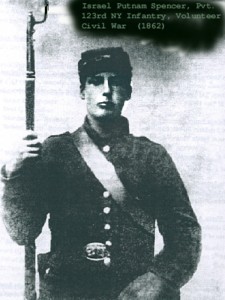 Israel Putnam Spencer, who is my sixth cousin twice removed, was a writer in his own right. He wrote a journal of sorts that dated back to his earliest recollections, beginning at about four or five years of age. Not everyone can remember very much about themselves at that age, although I think a number of us can. Usually it is some traumatic even, such as illness, a death, or as in my cast, an accident, in which I lost a fight with an escalator. For Israel, it was both illness and death. Israel states that he was just “getting over a spell of sickness” in the town of DeRuyter, Madison County, New York. He talks of moving to Corning, Steuben County, New York where the family lived another four years. This place had no stove, so cooking was done over the fire in the fireplace. It was in Corning that he and his sister got the measles, and his aunt, his mother’s sister died…probably also of measles, as they were very dangerous in those days. His writings tell of hard times…of moving to live with his mother’s brother, Frank Lewis. Hard times in that after finding a dog and being so excited to have a pet, they had to give the dog to a cousin. I’m sure these things all seemed extra hard to a young boy of about nine or ten. Yet, in the midst of those hard times, the family arrived at Israel’s Uncle Frank’s house, to find the dog, that they hadn’t seen in two years…and the dog remembered them, and was so excited to see them. That friendship must have felt like the sun coming out after a long raging storm.
Israel Putnam Spencer, who is my sixth cousin twice removed, was a writer in his own right. He wrote a journal of sorts that dated back to his earliest recollections, beginning at about four or five years of age. Not everyone can remember very much about themselves at that age, although I think a number of us can. Usually it is some traumatic even, such as illness, a death, or as in my cast, an accident, in which I lost a fight with an escalator. For Israel, it was both illness and death. Israel states that he was just “getting over a spell of sickness” in the town of DeRuyter, Madison County, New York. He talks of moving to Corning, Steuben County, New York where the family lived another four years. This place had no stove, so cooking was done over the fire in the fireplace. It was in Corning that he and his sister got the measles, and his aunt, his mother’s sister died…probably also of measles, as they were very dangerous in those days. His writings tell of hard times…of moving to live with his mother’s brother, Frank Lewis. Hard times in that after finding a dog and being so excited to have a pet, they had to give the dog to a cousin. I’m sure these things all seemed extra hard to a young boy of about nine or ten. Yet, in the midst of those hard times, the family arrived at Israel’s Uncle Frank’s house, to find the dog, that they hadn’t seen in two years…and the dog remembered them, and was so excited to see them. That friendship must have felt like the sun coming out after a long raging storm.
Soon things were looking up for the family, and Israel’s dad bought a farm where the family lived until Israel was fourteen and then he traded that farm for a 100 acre farm just a sort distance away. That farm brought about a big change for the Israel and his brothers because they now have to work the farm, in order to keep up. They went to school in the winter and worked the farm in summer. Then Israel writes of reaching an age where he got a “big head” like most boys did at about 15 to 18 years of age. He said that he got to a point where he was convinced that he knew more than the teachers and his parents combined, and so he quit school at 17 years old. He got odd jobs, and made about $15.00 a month…about average for a 17 year old in those days, I suppose, but maybe less than if he had more schooling…these days anyway.
Then came the biggest change of Israel’s life…the Civil War started in 1861. His oldest brother, Morton Spencer 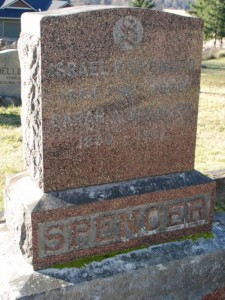 enlisted in Company E, 23rd New York Infantry for two years. Shortly thereafter, Israel’s brother Fred Spencer enlisted, and Israel joined him. It was August 6th of 1862, and Israel was 18 years and 2 months old. Israel tells of his time spent in the war, with an insider’s view that most of us never got to hear about. The northern army, and I suspect the southern army as well, were having trouble keeping their officers. Back then, they didn’t have the came controls over the people in the army. A person could be missing for weeks before anyone really got word of it. Of course, when an officer goes missing, and you are one of his men, you know it, and that is what happened at times…especially when the war put brother against brother, as was the case in the Civil War. He survived the war, as did his brothers, but those were days of hunger and lack. He chose in later years, not to talk about them much, because who would want to remember such a time. He did write about those day, and there are many more tales to tell of the Civil War, but that is a story for another day.
enlisted in Company E, 23rd New York Infantry for two years. Shortly thereafter, Israel’s brother Fred Spencer enlisted, and Israel joined him. It was August 6th of 1862, and Israel was 18 years and 2 months old. Israel tells of his time spent in the war, with an insider’s view that most of us never got to hear about. The northern army, and I suspect the southern army as well, were having trouble keeping their officers. Back then, they didn’t have the came controls over the people in the army. A person could be missing for weeks before anyone really got word of it. Of course, when an officer goes missing, and you are one of his men, you know it, and that is what happened at times…especially when the war put brother against brother, as was the case in the Civil War. He survived the war, as did his brothers, but those were days of hunger and lack. He chose in later years, not to talk about them much, because who would want to remember such a time. He did write about those day, and there are many more tales to tell of the Civil War, but that is a story for another day.
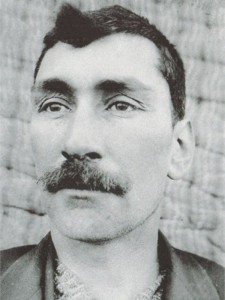 Like many people, my great grand uncle, Cornealius Spencer and his wife Leola Stinson Spencer left Iowa and made their way to Oklahoma in the spring of 1893. With them were their children and Leola’s parents. They had heard that the government was giving away land and they had decided to make a new start. The homestead they received was 160 acres, but the land came with qualifications. The homestead owner was required to fence the land, build a building, and live on the land for a period of one year before it became theirs. When I think of those reasonable qualifications, in light of today and all we have now, I think that the land they received was really cheap…and maybe it was, but times were different then, and living on a piece of land that had no improvements, and the soil was hard and rocky, might not have been so easy. They didn’t have the farming equipment we have now, so they had to till the ground with a team of horses or a yoke of oxen and a hand plow. They couldn’t just run down to the lumber store to buy building supplies. They had to cut down their own logs to build a home, or live in a sod hut…which many people then did for a time.
Like many people, my great grand uncle, Cornealius Spencer and his wife Leola Stinson Spencer left Iowa and made their way to Oklahoma in the spring of 1893. With them were their children and Leola’s parents. They had heard that the government was giving away land and they had decided to make a new start. The homestead they received was 160 acres, but the land came with qualifications. The homestead owner was required to fence the land, build a building, and live on the land for a period of one year before it became theirs. When I think of those reasonable qualifications, in light of today and all we have now, I think that the land they received was really cheap…and maybe it was, but times were different then, and living on a piece of land that had no improvements, and the soil was hard and rocky, might not have been so easy. They didn’t have the farming equipment we have now, so they had to till the ground with a team of horses or a yoke of oxen and a hand plow. They couldn’t just run down to the lumber store to buy building supplies. They had to cut down their own logs to build a home, or live in a sod hut…which many people then did for a time.
The families arrived with two covered wagons and Leola with two small children…four year old Oren and two year old Edith. The wagons were pulled by a pair of oxen. With no bits or lines to guide the oxen. They pulled the wagon by a yoke and Leola had to guide them by the voice commands or “gee” and “haw” for left and right and “whoa” for stop. The milk cow was tied to the wagon and the family brought along a coop of chickens. They camped out at night, and let the chickens eat the bugs in the area. There were no roads to get to Oklahoma, so they had to simply go across the prairie.
Once they arrived in Blaine county, the men filed on two places that were next to each other. Each place had a spring for water, until a well could be dug. They dug a dugout near the spring, and were settled by June 12, 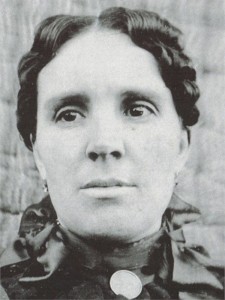 1893, when their new daughter Elsie Jane was born. They lived in the dugout until a home could be built. There were no towns close, so they had to rely on what they could hunt. Thankfully there was an abundance of deer, rabbits, turkeys, and even squirrels, so they never went hungry. Both Cornealius and Leola were excellent shots, so it didn’t matter who was available to hunt, both were able to get food for the family.
1893, when their new daughter Elsie Jane was born. They lived in the dugout until a home could be built. There were no towns close, so they had to rely on what they could hunt. Thankfully there was an abundance of deer, rabbits, turkeys, and even squirrels, so they never went hungry. Both Cornealius and Leola were excellent shots, so it didn’t matter who was available to hunt, both were able to get food for the family.
I can fully understand why it was so hard to make a homestead work now, because the supplies the homesteaders needed were not readily available. Many people gave up and headed back east, but my great grand uncle and his family stuck it out, and spent their remaining years in Oklahoma. They would raise their ten children there and were very successful in their endeavors. Homesteading wasn’t designed to be easy. Getting 160 acres of land is a big deal, and while the land ended up being free in the monetary sense, it certainly did not in the blood, sweat, and tears sense. The homesteader earned every inch of that property.
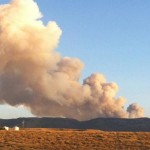 We have watched with great sadness as our beloved mountain burns. The burned area has grown to 18,000 acres and 37 lost structures. The fire crews have done an awesome job of fighting this fire. The winds in our area and the lack of rain could have made this fire a much more catastrophic event than it has been, in that at one point they thought the winds could possibly shift and the fire come back down the face of the mountain heading West. Prior to that point of concern, it had been mostly on top and headed East. Many people do not fully understand the gravity of 18,000 burned acres. Until you see all those dead trees standing where lush green trees used to be, you just can’t fully picture it. Looking through the burned areas that suddenly have far too much light for a forest, I get an extreme sense of sadness…even a sense of dread…because it will take so long to regrow that forest, and there is no quick and easy solution that could change that fact.
We have watched with great sadness as our beloved mountain burns. The burned area has grown to 18,000 acres and 37 lost structures. The fire crews have done an awesome job of fighting this fire. The winds in our area and the lack of rain could have made this fire a much more catastrophic event than it has been, in that at one point they thought the winds could possibly shift and the fire come back down the face of the mountain heading West. Prior to that point of concern, it had been mostly on top and headed East. Many people do not fully understand the gravity of 18,000 burned acres. Until you see all those dead trees standing where lush green trees used to be, you just can’t fully picture it. Looking through the burned areas that suddenly have far too much light for a forest, I get an extreme sense of sadness…even a sense of dread…because it will take so long to regrow that forest, and there is no quick and easy solution that could change that fact.
I was looking through some old pictures and came across one of Bob’s family 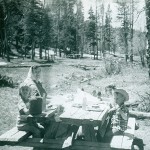 having a picnic up on Casper Mountain in May of 1960. The picnic table was made of wood, of course, and I don’t think any of them are now. Even though the picture is in black and white, you can see the green trees in the background, and you know that everyone was having a wonderful time, as is normal on Casper Mountain. I don’t know of one person who has ever lived in Casper, who did not love the mountain. Whether you preferred to go to the lake or the mountain, you loved the beautiful backdrop it created. And truly, I don’t know of anyone who didn’t love going up there…even just for a picnic. The peacefulness and quiet are so relaxing and the birds, especially the hummingbirds that most people are thrilled to watch, always put me at ease. I feel especially sad for all the animals and birds whose homes and food have been lost to them. Yes they can migrate into other areas, but the food source will take a definite hit.
having a picnic up on Casper Mountain in May of 1960. The picnic table was made of wood, of course, and I don’t think any of them are now. Even though the picture is in black and white, you can see the green trees in the background, and you know that everyone was having a wonderful time, as is normal on Casper Mountain. I don’t know of one person who has ever lived in Casper, who did not love the mountain. Whether you preferred to go to the lake or the mountain, you loved the beautiful backdrop it created. And truly, I don’t know of anyone who didn’t love going up there…even just for a picnic. The peacefulness and quiet are so relaxing and the birds, especially the hummingbirds that most people are thrilled to watch, always put me at ease. I feel especially sad for all the animals and birds whose homes and food have been lost to them. Yes they can migrate into other areas, but the food source will take a definite hit.
I remember throughout the years of my childhood, when our family would go up on the mountain, even if just for the day, and just hang out enjoying the beauty of it, the quiet, and the birds. Then in the evening, we would sit around the campfire roasting marshmellows and dodging the smoke that always seemed to be coming right into your eyes. 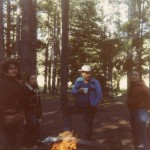 We almost made it a game…laughing at the person who was getting bombarged with the smoke at any given moment. That always seemed so funny to us, but in the face of the current fire, it takes on a different meaning. The amount of smoke and ash that has been rolling off of our mountain is simply dangerous to be breathing. When I think about the firefighters who have worked tirelessly to try our beloved mountain, I feel a deep sense of gratitude. Our mountain will never be quite the same, but it will come back eventually to some degree. Insurance policies will help pay for repairs and rebuilding of structures, but, our minds will probably never forget those horrible pictures of the fire on the mountain.
We almost made it a game…laughing at the person who was getting bombarged with the smoke at any given moment. That always seemed so funny to us, but in the face of the current fire, it takes on a different meaning. The amount of smoke and ash that has been rolling off of our mountain is simply dangerous to be breathing. When I think about the firefighters who have worked tirelessly to try our beloved mountain, I feel a deep sense of gratitude. Our mountain will never be quite the same, but it will come back eventually to some degree. Insurance policies will help pay for repairs and rebuilding of structures, but, our minds will probably never forget those horrible pictures of the fire on the mountain.

